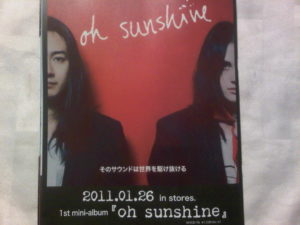 Oh sunshine creates something new in Japan which often did the opposite before
Oh sunshine creates something new in Japan which often did the opposite before
Japanese popular music used to be very local like mobile phones Japanese electronic companies produce. Even though many talented musicians made lots of songs in Japan, most of them are consumed in the country. While Japanese pop songs have little impact overseas, the country has been importing millions of pop songs from around the world, particularly from western countries like America and Britain, for a long time. Musicians in the country have translated import music into something Japanese people liked. That is similar to Japanese mobile phones, which are sometimes referred to as “the Galapagos effect”. But now a new rock band may be changing that.
It is oh sunshine formed by Emily Connor, an American vocalist living in Tokyo, and Mikio Hirama, a Japanese famous guitarist, in 2010. They made its first mini album, oh sunshine, this January. Their lyrics are written in both English and Japanese. Youtube shows their growing popularity in North America, Australian and Japan.
The combination of American and Japanese musicians is rare in Japan’s popular music. It is not surprising that excellent Japanese musicians create something in collaboration with foreign artists. But when it comes to what language they use, they hardly do so in Japanese. Neither do Japanese people see American singers sing songs in Japanese. Nor do they bother many Japanese singers’ pseudo English. Thus, singing in Japanese as well as real English, Emily is quite distinct from other singers. Her Japanese is excellent. And history shows that foreign singers singing in Japanese, for example Mrs Rosanna Zambon, who is a successful Italian singer, go down well with the Japanese.
That is significant for Japanese pop music, or J-POP. When she was a teenager, Emily had already been interested in Japanese popular music. This is notable as American culture has been much more influential than those of other countries for decades. The word “J-POP” was invented in a bid to make Japanese pop music more global in the early 1990s when Japan’s economy introduced deregulation and privatisation. J-POP has become widespread in Asia today. Maybe, it is achieving its aim: to be on a par with western music.
That progress means that there are still differences between J-POP and western popular music. It may be true that the world is shrinking. In bounce, a free paper from a music store, Hirama says, “I think that the cultural difference between Japan and America is eroding”. Takahiro Matsumoto, a successful Japanese guitarist, won the award for Best Pop Instrumental Album of the 2011 Grammy Awards, which proved that Japanese professional guitarists have the high standard. Hirama also plays the guitar brilliantly. But, perhaps, Japanese songs put more emphasis on the lyrics than the rhythm. The words of beautiful are literally beautiful, which Emily sings sadly.
The unit is taking on an exciting challenge of creating a “real” music that crosses cultural, generational and national borders, and a sound that shakes people’s “souls”. Can they achieve it? You never know. All I can tell you is that to increase fans, karaoke is important as it is a good way to promote songs. But rock and English are not easy for ordinary Japanese people to sing and speak.

Ryo Kubota is a staff writer at Transpheric Management in Tokyo as well as a freelance writer. He has covered Sports for the Nippon Newspaper Company in Tokyo and teaches at a private tutoring school in Iruma, Japan. Having studied in both Tokyo and England in the areas of sociology, he has a keen interest in the world at large.








